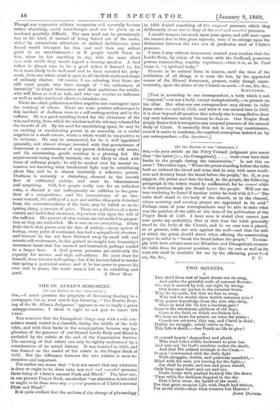THE ST. ALBAN'S JUDGMENT.
Ef0 TIIE EDITOR OF TI1E "SPECTATOR...) much question the propriety of discussing theology in a newspaper, but as your article last Saturday, "The Double Bearing of the St. Albates Judgment," appears to me to imply a grave misapprehension, I think it might to a.k you to insert this letter.
You conceive that the Evangelical clergy may with a safe con
science stand, vested in a chasuble, facing the middle of time holy table, and with their backs to the congregation, because any implication of the presence of our blessed Lord's Body and Blood is excluded by the rubric at the end of the Communion Service. The meaning of that rubric can only be rightly understood by a consideration of its actual history. It was inserted in 1662, and was framed on the model of the rubric in the Prayer Book of 1552. But the difference between the two rubrics is most instructive and important.
The earlier one states that "it is not meant that any adoration is done or ought to be done unto any real and essential presence there being of Christ's natural Flesh and Blood." The later one, in our present Prayer Book, asserts that "no adoration is intended or ought to be done unto any cwporal presence of Christ's natural Flesh and Blood."
It is quite evident that the authors of the change of phraseology in 1662 denied something of time corporal presence which they deliberately chose not to deny of the real and essential presence.
I should trespass too much upon your space, and still more upon the reserve due to this great mystery, were I to enlarge upon the distinction between the two sets of predicates used of Christ's presence.
I trust I may without irreverence remind your readers that the Lord's Body, by virtue of its union with the Godhead, possesses powers transcending sensible experience,—that it is, as St. Paul terms it, "a spiritual body."
Present in its natural form in heaven, until the time of the restitution of all things, it is none the less, by the appointed means of the Blessed Sacrament, present, really though supernaturally, upon the altars of the Church on earth.—I am, Sir, &c., SCRUTATOR.
[That is, according to our correspondent, a body which is not "corporal,"—or not a body, except metaphorically,—is present on the altar. But whatever our correspondent may choose to infer from what was said in 1552, and what it was altered into in 1662, it is clear beyond all question that nobody else is compelled to draw any such inference merely because he does so. Our Prayer Book simply denies that it recognizes any corporal presence of the natural Body of Christ. It assuredly does not in any way countenance, even if it omits to condemn, the mystical conception insisted on by our correspondent.—ED. Spectator.]


































 Previous page
Previous page